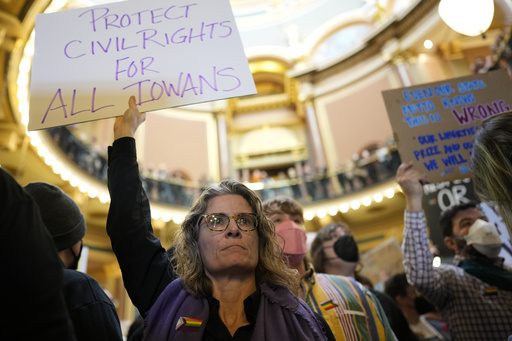In Des Moines, Iowa, lawmakers convened on Thursday amidst a notable police presence and a gathering of passionate protesters. They were meeting to deliberate a highly controversial bill seeking to remove gender identity protections from the state’s civil rights code. Advocates against the measure argue that this change could lead to discrimination against transgender individuals in numerous aspects of daily life. Both legislative chambers were set to cast their votes on the bill the same day. Notably, on the same day, the Georgia House decided to retain gender protections in the state’s hate crime laws, reversing an earlier decision to remove them.
The Iowa bill, introduced the prior week, swiftly advanced through the legislative process despite strong opposition from LGBTQ+ supporters who held rallies at the Capitol earlier in the week. Thursday saw a significant turnout of protesters brandishing signs and rainbow flags as they assembled in the Capitol rotunda. Their loud chants of “No hate in our state!” echoed before, during, and after a 90-minute public hearing. State troopers were positioned strategically around the rotunda and hearing room to maintain order.
Out of the 167 people registered to provide testimony at the House committee’s hearing, only 24 supported the bill. Every time a speaker exited the room, the loud protests outside interrupted the proceedings, necessitating frequent pauses. To mitigate these disruptions, a corridor outside the hearing room was cordoned off by state troopers, creating what was described as a “natural buffer,” according to Stephan Bayens, Commissioner of the Department of Public Safety. The measure was designed to ensure the hearing’s progression while safeguarding the right to protest.
In Iowa, gender identity was incorporated into the civil rights code back in 2007 when Democrats held the legislative majority. If this bill passes, it would position Iowa as the first state to retract explicit protections against discrimination based on gender identity, as per Logan Casey from the Movement Advancement Project. Meanwhile, in Georgia, suggested amendments to the state’s hate crime laws aimed at limiting sports participation for transgender students were revamped by a House committee at the last minute, preserving the word “gender” in the legislation.
The Iowa bill seeks to exclude gender identity from its protected classes, clearly defining female and male while confining gender’s definition to being synonymous with sex. Supporters believe that the current code incorrectly permits gender transition and grants transgender women entry to spaces designated for individuals assigned female at birth. Iowa Republicans argue their proposal strengthens existing restrictions concerning sports and public bathroom access for transgender students. Upon legislative approval, the bill would advance to Governor Kim Reynolds. Her spokesperson refrained from commenting on whether she intends to sign it.
V Fixmer-Oraiz, the inaugural speaker opposing the bill, who serves as a county supervisor in eastern Johnson County, testified that, as a transgender Iowan, they have endured substantial discrimination. They expressed concern that the legislation could exacerbate this issue. “It is the responsibility of the government to affirm, not to deny, citizens’ inalienable rights,” stated Fixmer-Oraiz. “Iowans merit superior treatment.” In contrast, Shellie Flockhart from Dallas Center voiced support for the bill, citing religious beliefs and advocating for women’s rights rooted in traditional views of biology and gender.
Approximately half of the U.S. states incorporate gender identity within their civil rights provisions to prevent discrimination in housing and public venues like stores or restaurants, based on findings from the Movement Advancement Project, an LGBTQ+ advocacy think tank. Some states achieve protection through statutory interpretations rather than explicit provisions. Notably, Iowa’s Supreme Court has previously ruled that discrimination against sex does not encompass gender identity discrimination.
In addition, several Republican-led legislatures are working toward more legislation this year that would legally define male and female as per reproductive organs observed at birth. This follows an executive order from former President Donald Trump, who initiated policies excluding transgender individuals from military service and sports. Many of these directives are facing legal challenges.




